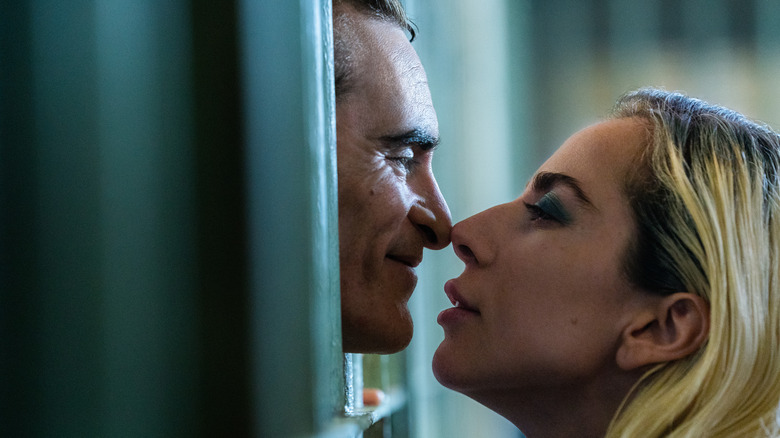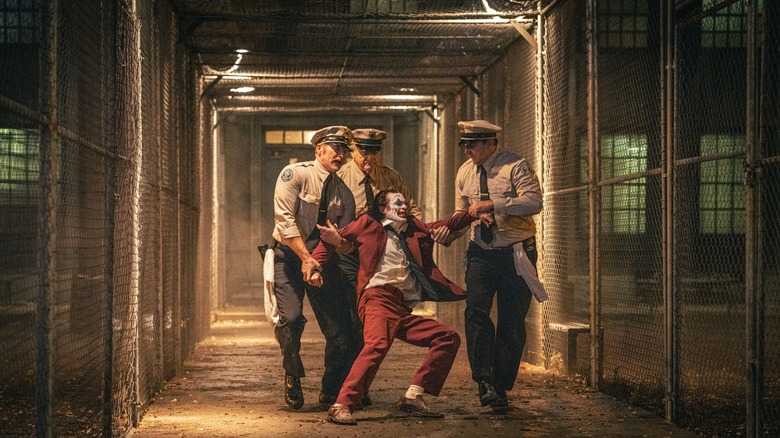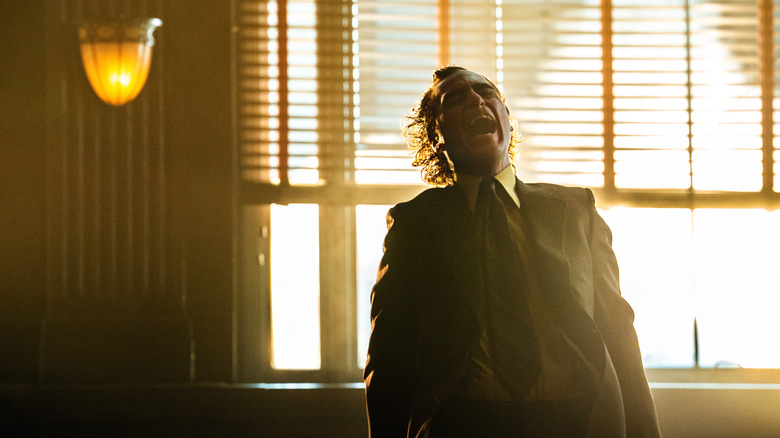Joker 2's Biggest Swing Is Bound To Leave You A Bit Shocked
Major spoilers for "Joker: Folie à Deux" follow.
Comic book movies aren't supposed to be like this. That narrative seemed to be the main hook behind the original "Joker" in 2019, starring Batman's greatest rival (though, notably, without Bruce Wayne ever actually suiting up as his alter ego) and telling a new, gritty origin story for the Clown Prince of Crime. It was enough to win Joaquin Phoenix Best Actor at the Academy Awards and break box office records for the R-rated blockbuster, but the long-awaited sequel always felt like it would take things up a notch or two. This time around, Phoenix is joined by Lady Gaga as Harley Quinn — or, as she's referred to in the film, "Lee Quinzel" — in a story that's nothing less than a full-blown musical. That's not how this superhero "genre" typically works, either.
But by the time "Joker: Folie à Deux" reaches its climax, director Todd Phillips goes and breaks another major rule: killing off his own title character in as shocking an ending since, dare I say it, Thanos emerged victorious in "Avengers: Infinity War." Well, at least we know why Phillips has been playing coy about whether a "Joker 3" would ever be in the cards (see what I did there?). It's a little difficult to move forward with another movie about the Joker if you just left the Joker for dead, definitively. The shocking twist arrives after a fairly prolonged descent into the supervillain's mind, set in the aftermath of his murderous rampage at the end of the first movie. Now a resident of Arkham Asylum and standing trial for his violent acts, the man known as Arthur Fleck would seem to have his fate sealed.
Rather than death by electric chair, the Joker ends up a victim of a fellow inmate — one who has some fairly Joker-like characteristics himself.
The Joker is dead -- long live the Joker?
Did you see that death coming? Arthur Fleck certainly didn't, having fully bought into his own delusions of grandeur. While his actions during the 2019 "Joker" actually did happen (well, other than the fantasy scenes involving Zazie Beetz's Sophie Dumond), there's reason to believe that much of what we see in "Folie à Deux" is a figment of his own feverish imagination. Did he truly strike up such an immediate connection with Lee (if she truly ever even existed), complete with one of the more off-putting sex scenes in superhero movie history? Was he really allowed to act as his own lawyer, decked out in clown makeup while intimidating his own witnesses? And did his antics actually inspire a wave of supporters, their combined adulation turning him into his own cult of personality? Whatever the reality may be, one thing's for sure: as his blood pools on the floor, the life drains out of his eyes, and the film fades to black, the Joker is well and truly dead.
But that's the thing about Gotham City — there's a clown behind every corner. To this point, the epic and tragic story of Arthur Fleck has felt like an alternate (though no less definitive) take on the origins of the Joker. Despite the first "Joker" including franchise mainstays such as Thomas and Bruce Wayne, nothing else has felt overtly comic-booky in the least. The man behind the clown mask obviously suffers from mental illness along with a taste for makeup, as opposed to falling into a vat of acid, while even his classic laugh is a result of an actual medical condition, rather than a villainous affectation. But what "Joker: Folie à Deux" implicitly suggests with his death is that Arthur Fleck wasn't the famous Batman villain all along. The unnamed inmate responsible for his death, however, very well might be.
Will the real Joker please stand up?
We already know that "Joker: Folie à Deux" is likely the last we'll ever see from this (relatively) standalone series of movies, but it feels fitting that it all possibly ends on an open-ended question mark. In retrospect, Arthur Fleck's ultimate fate was probably inevitable. Even the most famous prisoners better watch their back, lest they incur the wrath of other unhinged and extremely violent inmates. And without any real hope for salvation after openly admitting to his crimes in front of the jury and TV cameras alike (again, assuming any of that actually happened), the writing was all but on the wall. The big twist we didn't see coming, however, is that the murderer could very well have taken his first step towards becoming the actual Joker.
The death didn't come out of nowhere, mind you. Earlier in the film, while Arthur watches his own interview on TV with the other members of their cell block, we get a brief closeup of the same inmate glaring at the Joker with nothing less than outright distaste and hatred. With the foreshadowing already established, audiences likely knew something troubling was liable to happen the very next time he pops up again. Unfortunately for Arthur, that occurs when he's making his way through Arkham's labyrinthine hallways and momentarily left alone. Fortunately for that inmate, this seems to have been the push he needed to take the leap into outright insanity. After telling an awful joke (which is fully on brand for any Joker, wannabe or otherwise), the very literal punchline ends with Arthur getting shivved several times in the stomach and left to bleed out on the floor. With the perpetrator left out of focus, we can only listen as his manic screams end up in some very familiar-sounding laughter.
"Joker 3" won't be happening (at least, not with Phillips in the director's chair), but the Joker still lives on — even in his death.


